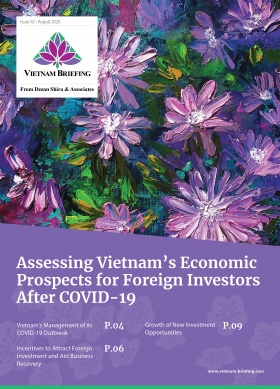Challenges in Vietnam’s Manufacturing M&A
- Mergers and Acquisitions are a popular route for foreign investors to enter Vietnam.
- However, recently M&As in manufacturing have faced challenges due to additional approvals based on Resolution 50.
- Investors should study local laws diligently to understand the risks and look at options available for a manufacturing M&A.
Mergers and Acquisitions (M&As) in Vietnam are a popular to route for foreign investors to enter the Vietnamese market. This trend continues in Vietnam and while global M&A activity has declined recently, M&A activity continues to be vibrant. While business activity and trade have slowed in 2020 due to the pandemic, we expect M&A activity to further pick up in 2021.
Challenges in manufacturing M&A
Having said this, recently foreign investors have faced some difficulties to get an M&A approval from the relevant authorities in the manufacturing industry. Local authorities are scrutinizing documents and investors have been asked for explanations on several parameters ranging from technology, machinery, labor use, source of input materials, product markets, and environmental protection.
These recent developments come as Vietnam becomes more selective in attracting FDI.
The restrictions seem to stem from Resolution No 50/NQ-TW (Resolution 50) on foreign investment policy towards 2030. As per Resolution 50, the provincial Ministry of Planning and Investment is responsible for scrutinizing such investments and has been told to hold approvals on expanding or renewing manufacturing projects that use old, obsolete technology which may cause damage to the environment. Resolution 50 is also stated in the new Law on Investment where investors can typically request an extension of an investment project except for those that use old, obsolete technology.
Dezan Shira & Associates’ International Business Advisory Manager, Trent Davies notes, “Because the Vietnamese government wants to push the manufacturing industry to be more value-added, cleaner and greener, the Law on Investment has provisions prohibiting older technology, machinery and the use of labor in acquiring capital in Vietnamese companies in the manufacturing industry.”
Thus, the provincial MPI has already started implementing Resolution 50 for renewing existing and new projects even though the Law on Investment doesn’t take effect until January 2021. This has resulted in additional time for the approval process with authorities asking for additional documents, particularly in relation to technology that is old, is harmful to the environment and is resource hungry.
Assessment guidelines unclear
Nevertheless, the government has so far not mentioned any guidelines on assessment, and as such the authorities may take additional time for scrutiny. Investors could possibly look at Decree No 18/2019/QD/TTg which bans the use of imported used machinery, equipment and production line technology for some guidance, though this may be inadequate on specific details.
In addition, in the absence of specific guidance, investors may also look at the Law on Technology Transfer 2017, (Law No 07/2017/QH14), which details the different explanations and documents required to present to the local MPI for M&A approval.
Accordingly, if there are any environmental concerns, the manufacturing project may be subject to further scrutiny as per the Law on Environmental Protection where investors may be to subject additional documents on environmental assessment, which in turn would add additional time to the process.
Prepare for a thorough due diligence
While Resolution 50 seeks to prioritize advanced manufacturing technology projects, in practice this may prove to be a hindrance for investors in manufacturing until the government issues further clarification.
Investors should therefore study the local market carefully and are advised to do their due diligence and seek advice from professional firms before they embark on an M&A manufacturing project. While the government may issue further guidance as the Law on Investment take effect in 2021, businesses that want to immediately jump into a manufacturing M&A may be subject to additional approvals at this stage.
About Us
Vietnam Briefing is produced by Dezan Shira & Associates. The firm assists foreign investors throughout Asia from offices across the world, including in Hanoi and Ho Chi Minh City. Readers may write to vietnam@dezshira.com for more support on doing business in Vietnam.
- Previous Article Q&A: M&A – Mergers & Acquisition Möglichkeiten und -Prozesse in Vietnam
- Next Article Renewables in Vietnam: Current Opportunities and Future Outlook
































